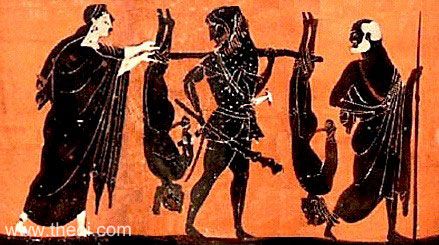KERKOPES
Greek Name
Κερκωψ Κερκωπες
Transliteration
Kerkôps, Kerkôpes
Latin Spelling
Cercops, Cercopes
Translation
Monkey (kerkôps)

THE KERKOPES (Cercopes) were a pair of monkey-like thieves which plagued the land of Lydia in western Anatolia. They were once captured by Herakles who was so amused with their jokes that he set them free unharmed. The pair later ran afoul of the god Zeus who transformed them into monkeys, or else turned them to stone, as punishment for their crimes.
The Kerkopes were sons of the Titan Okeanos (Oceanus) by Theia, a daughter of the Aithiopian (Ethiopian) king Memnon.
FAMILY OF THE CERCOPES
PARENTS
OKEANOS & THEIA (Hesiod The Cercopes)
NAMES
AKMON, PASSALOS (Hesiod The Cercopes)
ENCYCLOPEDIA
CERCO′PES (Kerkôpes), droll and thievish gnomes who play a part in the story of Heracles. Their number is commonly stated to have been two, but their names are not the same in all accounts, -- either Olus and Eurybatus, Sillus and Triballus, Passalus and Aclemon, Andulus and Atlantus, or Candulus and Atlas. (Suidas, s. vv.; Schol. ad Lucian. Alex. 4; Tzetz. Chil. v. 75.) Diodorus (iv. 31), however, speaks of a greater number of Cercopes. They are called sons of Theia, the daughter of Oceanus; they annoyed and robbed Heracles in his sleep, but they were taken prisoners by him, and either given to Omphale, or killed, or set free again. (Tzetz. ad Lycoph. 91.) The place in which they seem to have made their first appearance, was Thermopylae (Herod. vii. 216), but the comic poem Kerkôpes, which bore the name of Homer, probably placed them at Oechalia in Euboea, whereas others transferred them to Lydia (Suid. s. v. Eurubatos), or the islands called Pithecusae, which derived their name from the Cercopes who were changed into monkeys by Zeus for having cunningly deceived him. (Ov. Met. xiv. 90, &c.; Pomp. Mela, ii. 7.)
Source: Dictionary of Greek and Roman Biography and Mythology.
CLASSICAL LITERATURE QUOTES
Homerica, The Cercopes (from Suidas s.v. Kerkopes) (trans. Evelyn-White) (Greek epic
C8th to 7th B.C.) :
"Kerkopes (Cercopes). These were two brothers living upon the earth who practised every kind of knavery.
They were called Kerkopes (Monkeys) because of their cunning doings : one of them was named Passalos (Passalus)
and the other Akmon (Acmon). Their mother, a daughter of Memnon, seeing their tricks, told them to keep clear of
Black-Bottom, that is, of Herakles. These Kerkopes were sons of Theia and Okeanos (Oceanus), and are said to
have been turned to stone for trying to deceive Zeus. ‘Liars and cheats, skilled in deeds irremediable,
accomplished knaves. Far over the world they roamed deceiving men as they wandered continually.’"
Pseudo-Apollodorus, Bibliotheca 2. 132 (trans. Aldrich) (Greek mythographer C2nd
A.D.) :
"Herakles as Omphale's slave seized and tied up the Kerkopes (Cercopes) near Ephesos."
Herodotus, Histories 7. 216. 1 (trans. Godley) (Greek historian C5th B.C.)
:
"Alpenos, the Lokrian city nearest to Malis, near the rock called Blackbuttock [i.e. the name the Kerkopes
gave Herakles] and the seats of the Kerkopes (Cercopes), where it is narrowest."
Diodorus Siculus, Library of History 4. 31. 7 (trans. Oldfather) (Greek historian
C1st B.C.) :
"[Herakles] began to mete out punishment upon the robbers who infested the land [of Lydia]. As for the
Kerkopes (Cercopes), for instance, as they are called, who were robbing and committing many evil acts, some of
them he put to death and others he took captive and delivered in chains to Omphale."
Ovid, Metamorphoses 14. 89 ff (trans. Melville) (Roman epic C1st B.C. to C1st A.D.)
:
"Pithecusae [an island off the coast of Italy] placed on a bare hill, [was] named from its denizens [i.e.
the monkeys]. For once the Father of the Gods (Genitor Deum) [Zeus], who loathed the fraud and
falsehood of the Cercopes and all their crafty crimes, transformed the men into misshapen animals that seemed
both like and unlike humans, shrivelling their limbs, tilting and flattening their noses, ploughing their cheeks
with wrinkles of old age. Then, swathed all over in a tawny pelt, he sent them to dwell here, but first removed
the means of speech and use of tongues designed for shocking perjury, and left them but screeches and screams
for protest and complaint."
Suidas s.v. Agora Kerkopon (trans. Suda On Line) (Byzantine Greek lexicon C10th A.D.)
:
"Agora Kerkopon (Market of the Kerkopes) : They were in Ephesos. Herakles bound them on the orders
of Omphale, but he shrunk from killing them since their mother begged him. The proverb is spoken in reference to
ill-behaved and knavish people."
NAMES OF THE CERCOPES
Greek Name
Ακμων
Πασσαλος
Transliteration
Akmôn
Passalos
Latin Spelling
Acmon
Passalus
Translation
Anvil (akmôn)
Peg, Pin (passalos)
SOURCES
GREEK
- Homerica, The Cercopes Fragments - Greek Epic C8th - 7th B.C.
- Herodotus, Histories - Greek History C5th B.C.
- Apollodorus, The Library - Greek Mythography C2nd A.D.
- Diodorus Siculus, The Library of History - Greek History C1st B.C.
ROMAN
- Ovid, Metamorphoses - Latin Epic C1st B.C. - C1st A.D.
BYZANTINE
- Suidas, The Suda - Byzantine Greek Lexicon C10th A.D.
OTHER SOURCES
Other references not currently quoted here: Eustathius on Homer's Odysdey 1864, Tzetzes on Lycophron 97, Pomponius Mela 2.7.
BIBLIOGRAPHY
A complete bibliography of the translations quoted on this page.